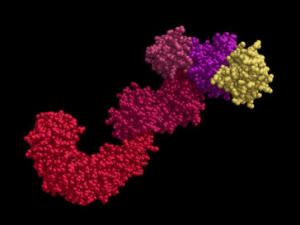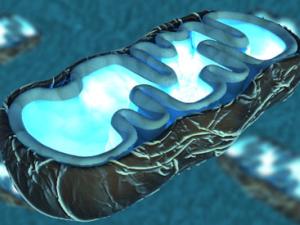

Research Bio
Danica Chen is a Professor of Metabolic Biology, Nutritional Sciences & Toxicology at University of California at Berkeley. She is a Searle Scholar, an Ellison Scholar, a Kavli Fellow, a Hellman Fellow, and an elected member of Academy for Healthy Longevity Research. Dr. Chen received Ph.D. in molecular and cell biology from University of California at Berkeley and obtained postdoctoral training in biology of aging at Massachusetts Institute of Technology.
One of the most fundamental questions in biology is how we age. The past decades have witnessed a significant revision of a traditional view that aging is simply a random and passive process that is solely driven by entropy. In fact, the aging process is regulated genetically and lifespan can be extended by single gene mutations. The Chen Lab research aims to understand molecular and cellular mechanisms that regulate the aging process and explore therapeutic targets to slow aging and even reverse aging-associated degeneration. The most intriguing aspect of pharmaceutical intervention that targets the aging pathways is that, instead of targeting a specific disease, it has the potential of ameliorating a wide array of seemingly unrelated diseases associated with aging, such as cancer, tissue degeneration, metabolic syndrome, and immune dysfunction.
Publications:
https://pubmed.ncbi.nlm.nih.gov/?term=chen+danica&sort=date
Selected research articles:
- Barthez, M., Xue, B., Zheng, J., Wang, Y., Song, Z., Mu, W., Wang, C., Guo, J., Yang, F., Ma, Z., Wei, X., Ye, C., Sims, N., Martinez-Sobrido, L., Perlman, S., Chen, D. (2025) SIRT2 suppresses aging-associated cGAS activation and protects aged mice from severe COVID-19. Cell Reports. 44 (4):115562.
- Song, Z., Park, S., Mu, W.-C., Feng, Y., Wang, C., Wang, Y., Barthez, M., Maruichi, A., Guo, J., Yang, F., Lin, A., Keydari, K., Chini, C., Chini, E., Jang, C., Chen, D. (2024) An NAD+-dependent Metabolic Checkpoint Regulates Hematopoietic Stem Cell Activation and Aging. Nature Aging. 4(10):1384-1393.
- Wang, C.*, Ohkubo, R.*, Mu, W.-C.*, Chen, W., Fan, J., Song, Z., Maruichi, A., Sudmant, P.H., Pisco, A.O., Dubal, D.B., Ji, N., and Chen, D. (2023) The Mitochondrial Unfolded Protein Response Regulates Hippocampal Neural Stem Cell Aging. Cell Metabolism. 35 (6):996-1008.
See also Research Highlights, Nature Review Neuroscience 24, 394 (2023).
- Ohkubo, R.*, Mu, W.-C.*, Wang, C.-L.*, Song, Z., Barthez, M., Wang, Y., Mitchener, N., Abdullayev, R., Lee, Y., Ma, Y., Curtin, M., Srinivasan, S., Zhang, X., Yang, F., Sudmant, P.H., Pisco, A.O., Neff, N., Haynes, C.M., and Chen, D.(2022) The Hepatic Integrated Stress Response Suppresses the Somatotroph Axis to Control Liver Damage in Nonalcoholic Fatty Liver Disease. Cell Reports. 41(11)111803.
- He, M.*, Chiang, H., Luo, H., Zheng, Z., Qiao, Q., Wang, L., Tan, M., Ohkubo, R., Mu, W.-C., Zhao, S., Wu, H., and Chen, D. (2020) An Acetylation Switch of the NLRP3 Inflammasome Regulates Aging-associated Chronic Inflammation and Insulin Resistance. Cell Metabolism. 31: 580-591.
See also In Brief, Nature Reviews Drug Discovery. (2020) doi: 10.1038/d41573-020-00019-x
See also Editors’ Choice, Science Translational Medicine. (2020) 12(531) eaba9021.
See also Research Highlight, Nature Immunology. (2020) 21, 358.
- Luo, H., Mu, W.-C., Karki, R., Chiang, H., Mohrin, M., Shin, J., Ohkubo, R., Ito, K., Kanneganti, T., and Chen, D.(2019) Mitochondrial Stress-initiated Aberrant Activation of the NLRP3 Inflammasome Regulates the Functional Deterioration of Hematopoietic Stem Cell Aging. Cell Reports. 26: 945-954
- Mohrin, M.*, Shin, J.*, Liu, Y.*, Brown, K.*, Luo, H., Xi, Y., Haynes, C., and Chen, D. (2015) A Mitochondrial UPR-mediated Metabolic Checkpoint Regulates Hematopoietic Stem Cell Aging. Science 347 (6228): 1374-77.
See also Perspective, Science. (2015) 347 (6228): 1319-20.
See also Nature Reviews Molecular Cell Biology. (2015) 16 (5): 266-7.
See also Leading Edge, Cell. (2015) 161 (6): 1235-7.
See also Editors’ Choice, Science Signaling. (2015) 8 (369): ec72.
- Shin, J.*, He, M.*, Liu, Y.*, Paredes, S.*, Villanova, L., Brown, K., Qiu, X., Nabavi, N., Mohrin, M., Wojnoonski, K., Li, P., Cheng, H., Murphy, A., Valenzuela, D., Luo, H., Kapahi, P., Krauss, R., Mostoslavsky, R., Yancopoulos, G., Alt, F., Chua, K., and Chen, D. (2013) SIRT7 Represses Myc Activity to Suppress ER Stress and Prevent Fatty Liver Disease. Cell Reports 5(3):654-665.
- Brown, K.*, Xie, S.*, Qiu, X., Mohrin, M., Shin, J., Liu, Y., Zhang, D., Scadden, D., Chen, D. (2013) SIRT3 reverses aging-associated degeneration. Cell Reports 3(2):319-27.
See also Editors’ choice, Science. (2013) 339: 884.
See also Cell Reports Best of 2013.
- Qiu, X*., Brown, K*., Hirschey, M., Verdin, E., and Chen, D. (2010) Calorie restriction reduces oxidative stress by SIRT3-mediated SOD2 activation. Cell Metabolism. 12: 662-667.
- Nakahata, Y., Kaluzova, M., Grimaldi, B., Sahar, S., Hirayama, J., Chen, D., Brunet, A., Guarente., L, and Sassone-Corsi, P. (2008) The NAD-dependent Deacetylase SIRT1 Modulates CLOCK-Mediated Chromatin Remodeling and Circadian Control. Cell. 134(2): 329-40.
- Liu, Y.*, Dentin, R*., Chen, D.* (* equal contribution), Ravnskjaer, K., Cole, P., Olefsky, J., Yates, J., Guarente, L. and Montminy, M. (2008) SIRT1-modulated gluconeogenesis via deacetylation of TORC2. Nature. 456(7219): 269-73.
- Chen, D., Bruno, J., Easlon, E., Lin, SJ., Alt, F. and Guarente, L. (2008) Tissue-specific regulation of SIRT1 by calorie restriction. Genes & Dev. 22(13): 1753-57.
- Chen, D., Steele, A., Lindquist, S., and Guarente, L. (2005) Increase in activity during calorie restriction requires Sirt1. Science. 310:1641. PMID: 16339438
Selected Reviews & Views:
- Barthez M, Chen D. (2025) UPRmt controls the mesenchymal-to-epithelial transition. Nature Metabolism. 7(5):871-872. doi: 10.1038/s42255-025-01260-7.
- Wang Y, Barthez M, Chen D. (2023) Mitochondrial regulation in stem cells. Trends in Cell Biology. 34(8):685-694.
- Montllor-Albalate C, Song Z, Chen D. (2021) The Therapeutic promises of NAD+ boosters. Cell Metab.33(7):1274-1275. doi: 10.1016/j.cmet.2021.06.008.PMID: 34233170
- Calimport SRG, Bentley BL, Stewart CE, Pawelec G, Scuteri A, Vinciguerra M, Slack C, Chen D, Harries LW, Marchant G, Fleming GA, Conboy M, Antebi A, Small GW, Gil J, Lakatta EG, Richardson A, Rosen C, Nikolich K, Wyss-Coray T, Steinman L, Montine T, de Magalhães JP, Campisi J, Church G. (2020) The inherent challenges of classifying senescence-Response. Science. 368(6491):595-596.
- Stuart R. G. Calimport, Barry L. Bentley, Claire E. Stewart, Graham Pawelec, Angelo Scuteri, Manlio Vinciguerra, Cathy Slack, Danica Chen, Lorna W. Harries, Gary Marchant, G. Alexander Fleming, Michael Conboy, Adam Antebi, Gary W. Small, Jesus Gil, Edward G. Lakatta, Arlan Richardson, Clifford Rosen, Karoly Nikolich, Tony Wyss-Coray, Lawrence Steinman, Thomas Montine, João Pedro de Magalhães, Judith Campisi, George Church. (2019) To help aging populations, classify organismal senescence. Science. 366 (6465):576-8.
- Chen, D. and Kerr, C. (2019) The Epigenetics of Stem Cell Aging Comes of Age. Trends Cell Biol. 29 (7): 563-8.
- Ohkubo, R. and Chen, D. (2017) Aging: rewiring the circadian clock. Nature Structural & Molecular Biology.24(9): 687-8.
- Luo, H., Chiang, H., Louw, M., Susanto, A, and Chen, D. (2017) Nutrient Sensing and the Oxidative Stress Response. Trends in Endocrinology & Metabolism. 28(6):449-460
- Xi, Y. and Chen, D. (2014) Partitioning the Circadian Clock. Science. 345 (6201):1122-3.
- Shin, J., Zhang, D., and Chen, D. (2011) Reversible acetylation of metabolic enzymes celebration: SIRT2 and p300 join the party. Molecular Cell. 43(1):3-5.
- Baur JA, Chen D., Chini EN, Chua K, Cohen HY, de Cabo R, Deng C, Dimmeler S, Gius D, Guarente LP, Helfand SL, Imai S, Itoh H, Kadowaki T, Koya D, Leeuwenburgh C, McBurney M, Nabeshima Y, Neri C, Oberdoerffer P, Pestell RG, Rogina B, Sadoshima J, Sartorelli V, Serrano M, Sinclair DA, Steegborn C, Tatar M, Tissenbaum HA, Tong Q, Tsubota K, Vaquero A, Verdin E. (2010) Dietary restriction: standing up for sirtuins. Science. 329(5995):1012-3.
- Chen, D., and Guarente, L. (2007) Sir2: A potential target for calorie restriction mimetics. Trends in Molecular Medicine. 13(2): 64-71.
Research Expertise and Interest
aging, stem cell, metabolism, diseases of aging
In the News
Molecular ‘switch’ reverses chronic inflammation and aging
Even at a Molecular Level, Taking it Slow Helps Us Cope With Stress
UC Berkeley scientists have identified a new molecular pathway critical to aging. They found that by slowing down the activity of mitochondria in the blood stem cells of mice, they could enhance the cells’ capacity to handle stress and rejuvenate old blood.
Discovery opens the door to a potential ‘molecular fountain of youth’
A new study led by researchers at the University of California, Berkeley, represents a major advance in the understanding of the molecular mechanisms behind aging while providing new hope for the development of targeted treatments for age-related degenerative diseases.



